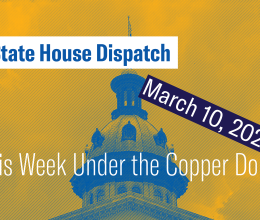
Episode 4: Life After Dobbs
Our guests are three people living with the consequences of South Carolina’s extreme anti-abortion law. They are Dr. Jessica Tarleton, an OB/GYN from South Carolina; and Emma and Zach Giglio, a married couple from Summerville who were forced to seek an abortion out of state.
To sign the Repeal the Ban petition, visit aclusc.org/RepealTheBan.
Disclaimer: The participants in this podcast episode are not lawyers, and the contents of this episode should not be taken as legal advice.
Music on today’s episode is by Daft Hartley and A Spot on the Hill.
Transcript
PAUL BOWERS: Welcome to While I Breathe, a podcast production of the ACLU of South Carolina. This is episode four. I'm your host, Paul Bowers.
JACE WOODRUM: And I'm your other host, Jace Woodrum.
BOWERS: Jace, we're here to talk about abortion rights in South Carolina. Our guests today are going to share their stories about what happens when the state takes away reproductive freedom. As a warning to our listeners, I want to note here that these stories involve pregnancy complications, extremely difficult medical decisions, and, frankly, intense grief. This is going to be a hard episode to get through, but I think it's worthwhile to have the conversation.
Before we get into that conversation, I wanted to go over the basics of reproductive rights in our state. So Jace, can we just start by talking about the law that Governor McMaster signed in 2023?
WOODRUM: So in 2023, our state lawmakers introduced and passed Senate Bill 474, which bans abortions at a time when most people don't even know they are pregnant yet. While the law does provide some exceptions, they are so narrowly defined that they are not practically useful in many cases. Specifically, the law bans abortions after the time when a "fetal heartbeat" is detected, but that's really a medical misdomer. Proponents of this bill have argued that this means abortion is illegal six weeks after a pregnant person's last menstrual period, but the science is not on their side.
BOWERS: Right, I mean it's more of a political slogan than a medical term. The American College of Obstetricians and Gynecologists has said that it's medically inaccurate to describe the electrical impulses detectable at six weeks as a heartbeat. Even Chief Justice Donald Beatty of the South Carolina Supreme Court has written that the terminology there is medically and scientifically inaccurate and that it is "a quintessential example of political gaslighting."
WOODRUM: Right, so the South Carolina Supreme Court initially blocked this law from taking effect, citing the state constitution's privacy protections. But they reversed course in August 2023 after the only woman on the court retired, leaving us with the only all -male Supreme Court in the entire country. Justice Beatty dissented, but the law went into effect.
BOWERS: And that brings us to today. Planned Parenthood South Atlantic is suing to challenge the law, but in the meantime, South Carolinians are suffering the consequences. Our guests today on the podcast are three people living with those consequences. They are Dr. Jessica Tarleton, an OB/GYN from South Carolina, and Emma and Zach Giglio, a married couple from Summerville who were forced to seek an abortion out of state.
WOODRUM: We'll mention this again at the end of the episode, but we do have a Repeal the Ban petition that we are circulating with our partners at Planned Parenthood. We're asking lawmakers to repeal this harmful law. If you go to aclusc.org/RepealTheBan, you can sign the petition there.
BOWERS: Dr. Tarleton, thank you so much for joining us. Before we get too far under the show, I was wondering, could you share a little bit about your work in the medical field and your areas of expertise?
DR. JESSICA TARLETON: Yeah, absolutely. And thanks again for having me. It has indeed been a difficult couple of years now in South Carolina. I am a full spectrum OB/GYN provider in South Carolina. In addition to being board certified as an OB/GYN, I'm also a specialist in complex family planning and reproductive infectious diseases. I'm also the secretary and treasurer for the South Carolina section of the American College of Obstetrics and Gynecology or ACOG, which is sort of the governing physician body for the OB/GYN community in this country.
BOWERS: Now, Emma and Zach, I was wondering if the two of you could start just by sharing a little bit about yourselves, your family, and the life you've built together in South Carolina.
EMMA GIGLIO: I am Emma Giglio. I'm originally from South Africa, and Zach is originally from Long Island, New York. And we moved to Summerville at the end of 2018. This is where we wanted to start our family and our life. And we had our first child in 2020. It was in the middle of COVID craziness, and at the same time we decided to also start our business. So we started our business at the same time as starting our family in May of 2020.
BOWERS: What a time.
EMMA: Yes, it was. It was a crazy time not just to start a business, but also to have a child. We just didn't know what, I mean, obviously you have no idea until you have a child what it's like, but it was a crazy time. And we've really established ourselves in the community here. We are members of the Chambers of Commerce. We actually won the Small Business of the Year 2023 last year. We sit on the board of -- well, Zach sits on the board of a nonprofit, Ohm Radio.
I'm also very involved with Postpartum Support Charleston. Soon after my son was born, I leaned on them for all the support that they provide and have since been part of their Beyond Delivery program where we deliver meals to moms, postpartum and little care packages. And then also more recently I reached out to them because I was looking for a in-person support group specific to pregnancy and infant loss. And together with them in memory of Sia, our son, our third son, we have started this in-person, therapist led support group for pregnancy and infant loss.
And yeah, that's kind of our life here in Summerville. We love it. We feel very part of this community. And this is where both our children were born. So we are very connected.
BOWERS: Emma and Zach, before what you went through as a family in 2023, how would you describe your beliefs about abortion and reproductive rights?
EMMA: So I'll go first for me. I have always been a proponent of a woman having the right to choose what they want to do with their bodies. And that has just always been, so I guess I'd say I was pro-choice. I always have been. I didn't, however, know that what we went through was even something that families have to consider. I never knew that at your 20-week anatomy scan that you could find something so severe that would cause you to have to terminate a pregnancy. That was never on my radar. I just never knew that that was something that families had to deal with. So while I say I was always pro-choice, I also didn't know. I guess you could say there maybe were limitations on where my beliefs were.
ZACH: And I've always also been pro -choice, but felt that we probably would want to have some sort of time restriction on when that decision could be made. And because I always felt and still do feel that I understand a lot of the pro-life argument and the side and what they're trying to protect and save. And I think I still see a lot of reason and value in that. But after this experience, I'm still pro-choice, but I now have just a deeper understanding of what this all involves, even though we already had two healthy kids, and believe very strongly there should be no limitations at all on a woman and a family making a decision for their family.
BOWERS: Well, Emma, we're recording today because you reached out to say you had a story to share. So let's get into it. Take the time that you need, but could you just tell us what happened in 2023?
EMMA: Sure. So we found out we were pregnant with our third child in August of 2023. This was a planned pregnancy. We were very excited. We had actually experienced a miscarriage in March of last year as well. So when we found out we were pregnant, we were actually visiting Zach's family and the whole family was there and I took the test and kind of came down and showed everybody and it was just very exciting. And we went through with all the checks, everything was going really smoothly. I had done all the early testing where they test for Down syndrome, cystic fibrosis, trisomy, all of the usual early testing, especially for someone in advanced maternal age. And I had also, you know, gone through all the regular early ultrasounds and yeah, just everything was going smoothly. There was nothing that was indicating that anything was wrong with the pregnancy.
So we went for the 20-week scan. It's a 20-week anatomy scan. Historically in our other pregnancies, this was always a very exciting appointment for us. It's the halfway point in the pregnancy. It's also where we get to see our baby's face. And just from our past experiences, it was always just, you know, there's always a little bit of anxiety going into that appointment, but it was never -- it just, you know, it was more just to double check everything was okay. But you go in with a sense of confidence that everything will be, you know ... It was just more of an exciting thing for us to go into.
My mom was actually there with us for that appointment. And the first scan, it took forever. We had a junior tech who did the first scan. It must've been about an hour, and she kept kind of going back to different parts of the baby. We didn't get to see his face. Then we had the more senior tech come in and she kind of kept going back to the brain and the heart.
And I think at that point Zach's radar went off, like this doesn't feel like some of the scans we've had in the past. And so he's kind of looking at the numbers on the screen and Googling. And for me, I just kind of was laying there kind of going through the motions. I didn't think there was anything wrong. It seemed unusual, but I was just kind of brushing it off to the fact that we first had the junior tech.
Anyway, it was about a two-hour scan. The tech went out to speak with the doctor and she came back in the room and said that the doctor wanted her to scan the brain and the heart again. So she did that again. And then she went out and came back in and it was her, the doctor, a nurse practitioner, as well as the genetic counselor. And so at that point we knew there was something really wrong with the baby.
So then we got the results back two days before Christmas, and we get the results. You get the results through the portal on your phone. And so we actually never find out the gender of our children until they are born, and mixed in with all the results, it said gender boy. So it was, you know, in hindsight, I'm very glad that we knew he was a boy for as long as we did, just so we could, I guess, speak to him as such in the time that we had left with him. So everything, all the results that we got back right before Christmas, it was about a week still before that second scan. Everything said it was, I was negative for the infections and normal or negative for any of the chromosomal abnormalities.
And so we went into the 22-week scan, maybe with a little sense of hope. We were kind of talking through what that would look like for our family having a child that might have special needs, talking through that together as well as with our extended family of kind of what our life will look like. So I say hope in the sense that -- not that nothing will be wrong, because at that point we're quite sure that there is something going on. But I guess more hopeful that we would carry a child to term and have a ... yeah, just that we had basically entered a new reality with the baby and we were okay with it.
BOWERS: So I'm a dad, and I remember going to scans with my wife and just feeling like I needed a crash course in a lot of things that I just knew nothing about. And I felt very anxious, and I sometimes would come out of one of these ultrasounds or meetings with the doctor and not remember half of what was said unless I wrote it down. It was just, it was a -- it was an overwhelming experience. I think it is probably for a lot of folks, but I was wondering if the two of you could share just your memory of the emotions. What did it feel like to receive news a little bit at a time from these doctors?
EMMA: I think for me, I kind of shut off everything when they started talking about everything that was was going on. My brain just went to "There's something wrong with my baby, there's something wrong with my baby." And I couldn't hear much else that was being said in those very early appointments. Zach, however, has a great ability to retain information. And he asks a lot of questions. And I would kind of get him to explain everything to me after the doctors had left the room.
But it is really hard hearing what you hear from the doctors. You know, at that 22 week scan, it wasn't just that things had gotten significantly worse with those, the heart, the brain that Zach mentioned, but also now his liver was impacted. So it started to become this systemic issue where different organs were getting impacted by whatever was causing this. And it was really hard to learn all of that and then to go home and try to process all of that information and do our own research, which is often unhelpful in some ways. And just, yeah, it's just quite a lonely experience actually going through all of that.
ZACH: Yeah, I think they, to your point, like it's a lot of information and it's a lot of information that is very technical and difficult to understand. And our situation continues even to this day as we sit here to be difficult to understand. And it felt like for me, I always find some comfort in information. So I truly believe that people can take good news and they can take bad news, but they can't take no news. And unfortunately we had so many questions that we didn't and still have not gotten clear answers on. One of the things that the doctor said was, we're not giving up on the pregnancy. And even after we had heard like so many of the tough things, like even the other things, like in the 22 week scan, the adrenal glands in the brain were hardening, the fluid around the baby was decreasing, which apparently is like a really telltale sign that maybe the pregnancy is going to end at some point.
But like, that that was even being suggested, that that could be something to give up on, was just really bizarre and surreal.
BOWERS: And so there was a -- there's a scan at 23 weeks that was more bad news, right?
EMMA: Yes, that's right. So we went, we had that 22-week scan at that point. The doctors we were seeing said that they wanted to ask to go for a second opinion somewhere else. And they also said that if we were to decide to continue with the pregnancy, that they wouldn't even be able to treat us at the specific place. So they referred us out. It was at that next appointment. So I'll say that, you know, at that 22 week scan, we still had so many questions and we of course, you know, wanted to go for that second opinion. But one of my doctors who has been my doctor since the birth of my first son, who we trust immensely, she was extremely straightforward with us and she recommended that based on everything she knew that we should terminate the pregnancy. And she was the only doctor in this whole experience that gave us that clarity, and it was the clarity that we needed and we respect.
And so at that point is when I started to look into abortion clinics. And I'm glad that I did at that point because the first available appointment was two weeks later, which put me at just over 24 weeks into the pregnancy. The longer you go and the longer you wait, obviously the risk increases of how I would have to deliver Sia. So obviously I didn't want to have to wait, and we weren't actually sure when that referral appointment was even going to be at that point.
So we went in for the 23-week scan and because we had this kind of sense of clarity on what we needed to do, but again, there's that sliver of hope that maybe they'll see something different. We felt equipped, I guess, going into that appointment to really probe the doctors on what we should do based on what they see and what they know. We spent, I don't even know, it must've been maybe an hour with a room full of doctors again, asking the same question multiple ways, just to try to get a clear response: If you, you know, if you, knowing what you know about us, our situation, what would you do? And there just was never a clear answer. Eventually the doctor told us to basically read between the lines. She, they didn't want to tell us or I don't know, even give us the clarity that we were hoping we would receive.
BOWERS: And so the state of South Carolina passed an extreme abortion ban, more extreme than what it had previously. And that took effect after the Supreme Court changed course and upheld it in the fall of 2023. So yeah, you're in this room. It's you and your medical providers with all their knowledge, with all the data they have before them. But then there is this other, I guess, thing hovering over every conversation, which is that it is illegal in a lot of cases to obtain an abortion in this state. So that's really striking, what you said, that one of them had to just tell you to read between the lines.
ZACH: I mean, there were multiple parts in the conversation where like we eventually -- I mean, this wasn't even just that one conversation. This was weeks of trying to get more clear answers, recommendations, opinions, ideas, anything that became very, very difficult.
BOWERS: So with all the facts in front of you, after all these long, agonizing conversations with doctors, what did you decide, and what did you have to do to get the care you needed?
EMMA: So we, as I said, following that 22-week scan, we had pretty much a good idea of what we needed to do, and that was to get an abortion. Given I was so far into the pregnancy, there are only a handful, I think it's 15 places in the whole country that can provide an abortion at this late stage of the pregnancy. And so we had to find a place to do that. And I'll say it's just part of this whole experience, just that isolation of having to make this decision on our own without really the doctors being able to give us that straightforward answer. And then the isolation of having to find a place to get the care that we needed. And then the isolation of going to that place that's not our home, not our trusted doctors is just, it's just lonely. The whole experience was incredibly lonely.
So we found a place that could, it could provide the care that we needed. And so we, I had to call them. I had to find out, you know, what was the cost that it was going to be. We actually called two places. The first place, it was going to cost $10,000. The second place, it was $7,500. And that's not even then including flights and hotel accommodation, the logistics that we needed to organize to have childcare for our children at home. Everything just kind of, it was just logistics, I guess, from the time we had to make that decision that we needed to terminate the pregnancy up until the time that we we ended up coming home.
So we had Zach's mom fly in so she could help watch the children, and we also secured a babysitter to stay the time that we would be away. We had to organize everything that comes with that with children's schedules and routines and packing lunches. We had our neighbor who would come over to take the kids, to drive the children to school in the mornings. It was just a lot of logistics that we had to organize.
But then also sitting in the waiting room at the abortion clinic, it just kind of all hit me where I think, prior to that, I was just so focused on the pain that I was going through that this was even something we had to consider. Sorry. But also just again, you know, organizing all the logistics that had to happen. But it was sitting in that abortion clinic where it just kind of hit me that it just felt really unfair that we were in a place we didn't know. We were far away from our family. We were going to be treated by doctors we don't know. The most intense, traumatic experience we've ever had in our whole life in a climate that we don't understand. It was snowing. It was like a snowstorm. It just felt incredibly unfair. And it was just so painful and traumatic in an already painful and traumatic situation for us. And then we had to get on a flight the next day to come home. We're staying in a hotel that, you know, it's just a hotel. It's not our home. And all of that was really hard.
BOWERS: Emma, thank you for sharing that. I cannot imagine. What you went through was traumatic in the base case. And then to do what you had to do apart from your support network and away from home really makes it that much more difficult. I feel like this is just one piece of the reality we're living in that is not always discussed very openly. That, you know, when we ban abortion in our state, it causes people to suffer in really new and cruel ways.
Dr. Tarleton, you've been here listening to this, and I wanted to bring you on just to share your perspective as a doctor. Hearing Emma's story, were there parts of it that sounded familiar or really resonated with you in your experience in the medical field?
TARLETON: Yes, unfortunately, a lot of it sounded familiar in a way that's not very good and not very complimentary to the medical system. I think the thing that pains me most from a healthcare service perspective and hearing Emma and Zach's story is that their physicians didn't feel comfortable counseling them directly with more than "reading between the lines" advice. As far as I know, and I think I'm quite familiar with the laws, there is no law preventing physicians or healthcare providers from recommending a course of action, recommending in particular abortion or at least giving information about abortion as an option. So there's not a real risk, whether or not there's a perceived risk or an institutional policy that prevents that.
I think much more likely is that there is a stigma now, more than before, because it's always been there, but a stigma that forces providers to distance themselves from even the concept of abortion, even in situations where the chance of a pregnancy ending in a live birth is very, very low. It's a disservice to our patients to have to give advice like that. At the same time, I've also been in the position of these doctors having to give bad news of this sort to a patient. And while giving the bad news, having to make calculations in my head about where can I recommend that this patient go for care? What can I recommend to the patient and how hard will it be for them to be able to take my recommendations?
At the same time I'm giving advice, at the moment that we are taught as doctors to be the most compassionate when we're giving bad news, we're also struggling to work through treatment options and how that could be construed in a legal sense. And, you know, one of the reasons that physicians might be hesitant to talk about or recommend abortion as potential treatment option is because the penalties for physicians having an infraction of the new abortion ban are very, very high. So an infringement of the law carries criminal penalties. And so, you know, we have malpractice insurance, which is a major part, especially of obstetrics that we can use if we are sued in a civil court for bad outcome. And now we're also having to think about, well, what if we have criminal charges pressed on us? What would that look like? How much would that cost? That is not covered by malpractice insurance. Would the cost of my legal advice end my private practice, would the fact that I'm charged with a criminal act allow me to continue practicing medicine and having a medical license? It's really very scary.
BOWERS: So you've been working in South Carolina, and this has not been a friendly state to abortion rights for quite some time, but we've really seen those rights erode. We saw the end of Roe v. Wade via the Dobbs decision. And then we saw a really extreme abortion ban take effect last year. To you, I mean, returning to the basic idea of just caring for your patients, giving them the care and the advice that they need to be healthy, how has this new abortion ban affected your ability to care for your patients?
TARLETON: Yeah, I think the obvious answer is that it's difficult for my patients to access abortion care. And it is now illegal for physicians who have the ability and willingness to provide this care from doing it. But the access to abortion care actually is just the tip of the iceberg in how abortion restrictions impact the practice of medicine and of obstetric and gynecologic care specifically, in particular early pregnancy care, including miscarriage care, ectopic pregnancy care. We have to think not only about what is the safest and most preferred treatment option for a miscarriage, but also how could this treatment be interpreted or misinterpreted legally? Could I be held with criminal charges from the care I provided for a miscarriage?
It also affects how we can provide emergency care to patients in the first half of pregnancy. People who support these bans always say yes, but we have exceptions that will allow you to take care of patients when they're in a life-threatening situation. But in South Carolina and in many states, the exceptions read something like a patient has to have a substantial risk of death or permanent disability, or there must be a fetal condition that cannot survive with or without life-sustaining treatment after birth. And so although it might sound easy to interpret that, it's really not in the moment. So as doctors, we are looking at a patient before us and saying, well, okay, this pregnancy poses a 10% risk of death to this patient. Is that a high enough risk of death to meet the legal requirements? Is a 50% risk of death enough if there's a 50% chance that a patient will survive the pregnancy? Or do we have to wait until there's a 99% or 100% chance of death? And by the way, while we're waiting for that, the patient might in fact die.
It is really putting physicians in an impossible place. Can you imagine another medical specialty where someone says, hey, I have a treatment that will prevent you from dying, but you have to be much closer to death before I will even entertain the thought of giving it to you? It's against everything that we are taught to do to prevent harm from patients in any practice of medicine.
BOWERS: I mean, it sounds like a decision paralysis that some doctors may face that is frustrating as a provider and then is also, in some cases, very dangerous to the patient.
TARLETON: Yes.
BOWERS: If as a medical provider, you are constantly thinking, well, yeah, is the risk high enough that we can intervene here? that's a really dangerous situation.
TARLETON: Absolutely. I think we're hearing a lot about this in the EMTALA case in the Supreme Court, the hearings. You know, these are cases where harm was done to patients and cases where we're calculating that -- whether or not harm is going to be done to a patient and how much and does that count? And is it worth risking my medical license for? These decisions are made on a daily basis, and it's just a really difficult place for medical providers to be in.
BOWERS: Well, Emma, I send it back to you. Hearing Dr. Tarleton's perspective on all this, does that shine a light on what you went through? I mean, does this sort of ring true with your experience?
EMMA: I mean, yes, for sure. We knew from the information that we had and the doctors had that there was something really severe and harmful happening to Sia. And while at that point there was no talk about my life being at risk, I definitely think the doctors, there was some kind of calculation of what they can say and what they can't say. As Zach articulated, I think the doctors eventually saying to read between the lines. I mean, we didn't get that clarity that we were searching for. And from the medical provider's perspective, as Dr. Tarleton said, I think that must be the calculations that they were making.
TARLETON: Absolutely. I think -- that just makes me so sad, but that is how we're counseling patients now. But I mean, I really want to emphasize that there's not a law that is forcing doctors to say "Read between the lines." They can say what's between the lines. There is no gag order against discussing all treatment options and referring. And in fact, if you don't refer for appropriate care, that can be considered, you know, a lapse of your duties. And so, yes, I think, I understand the calculations that are going through people's heads, but I think, you know, we need to -- I'd really encourage any physicians who are listening to this to really think about how this is impacting patients and how can we communicate more clearly with our patients, even in the face of scary things, scary legal threats. We're not restricted in what we can say. We're not restricted in the counseling that we can provide to patients.
BOWERS: I think, to draw an analogy to a situation with lower stakes, if you look at book banning laws, there is the text of the law, there are things that are being banned, and then there is the social pressure that gets exerted on teachers and librarians who, because of this law and because of the sort of dialogue around it, feel pressure to self-censor or to limit what they do in their profession. That seems to be the case with a lot of laws that restrict civil liberties in this country.
Well, Emma, returning to you, I wanted to end on a note about people who found ways to care for you and your family, despite the cruelty of our laws, despite the impossible situation you were put in. Were there people along the way who found ways to care for and support you?
EMMA: Yes, definitely. So, I mean, you know, the obvious ones are, of course, our family and our friends were incredibly supportive. And I think I just want to make a note on that just by saying that abortion is a very kind of taboo subject and we were hesitant or at least I was hesitant to tell our whole story to people in our circles who maybe are not as close to us and giving them the whole story and knowing that they maybe are more on the pro-life side of things. And I was nervous in telling them what happened because they knew, you know, we were pregnant. And the compassion and the love and the kindness that we have received from every single person that we have shared our story with is just so telling that this is a human issue. It doesn't matter what side of the aisle you sit on. I think it's something that goes beyond all that.
When you hear our story, you know that Sia was a wanted child. He was our third child. And the fact that it didn't end how we would have wanted or expected, it's heartbreaking. And it doesn't matter what side of the aisle you sit on. That kind of was our... has been our experience. And beyond our circle of family and friends, we got support in covering our financial expenses in taking the trip for our abortion. We got a call the day before saying that the social worker at the clinic had found funding to cover our entire procedure. I will pull up the names, and I do want to mention the names of those organizations.
But in addition to that, we had an organization called the Brigid Alliance, which essentially acted as our travel agent. They booked our hotel, they organized our flights. They even gave us a stipend for Uber rides that we would need to the airport, from the airport, and back to the clinic and all of that. They gave us a stipend for childcare to cover our costs when we were -- for our children at home. They even gave me a stipend for kind of postpartum supplies. It's just a really incredible organization.
And then another one I'd like to mention is called The Finley Project. The Finley Project provides support for moms who've gone through a loss after 20 weeks in pregnancy. It's a seven part program. They provided us with a meal voucher to cover food and everything after, you know, during our grieving process. They gave 12 sessions of counseling. They've provided us with a connection to another mom who has been through this, has been in a very similar situation to us who I can connect with and grieve with. And it's just, it's an amazing organization.
And then finally, as I said, at the very beginning of the podcast, I was looking for an in-person support group specific to pregnancy and infant loss, and I couldn't find one. So I reached out to Postpartum Support Charleston and so we've started, I think it might be the only one in the Charleston area, a therapist-led support group for pregnancy and infant loss, and we meet on the second Wednesday of every month and it's in Summerville. And I'm just very grateful for the support that we've received going through everything and working through what we're going through.
BOWERS: Well, Emma, I know you told me before that you are processing your grief over Sia and you're trying to bring some good out of what you've been through. And I see you doing that. Thank you for sharing the story and for just being willing to process that in an open way and help other people process it. Because I think that's an act of courage. So thank you for that.
EMMA: Thank you. Thank you for having us on this, giving us this platform to speak about Sia.
WOODRUM: Thank you again for listening to While I Breathe, a production of the ACLU of South Carolina. Again, if you want to send a message to state lawmakers voicing your opposition to the extreme abortion ban, you can sign the petition at aclusc.org/RepealTheBan.
BOWERS: And I just want to say thank you again to our guests for graciously sharing their stories. If you are suffering the consequences of our state's extreme anti-abortion law, know that you are not alone.
Music on today's episode is by Daft Hartley and A Spot on the Hill. We'll be back soon with another episode. Until then, while I breathe, I hope.
Related content

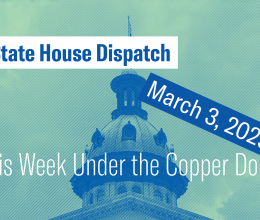
State House Dispatch: March 3, 2025
March 3, 2025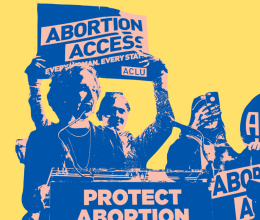
Stop the Total Abortion Ban
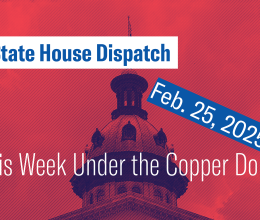
State House Dispatch: Feb. 24, 2025
February 25, 2025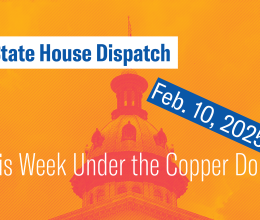
State House Dispatch: Feb. 10, 2025
February 10, 2025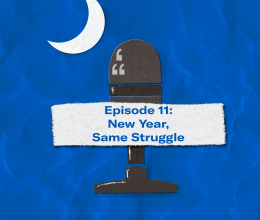
Episode 11: New Year, Same Struggle
December 23, 2024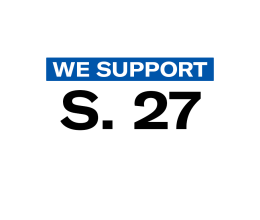
Reproductive Justice (S. 27)
December 11, 2024Op Ed: ACLU will keep fighting for abortion rights
June 23, 2023
